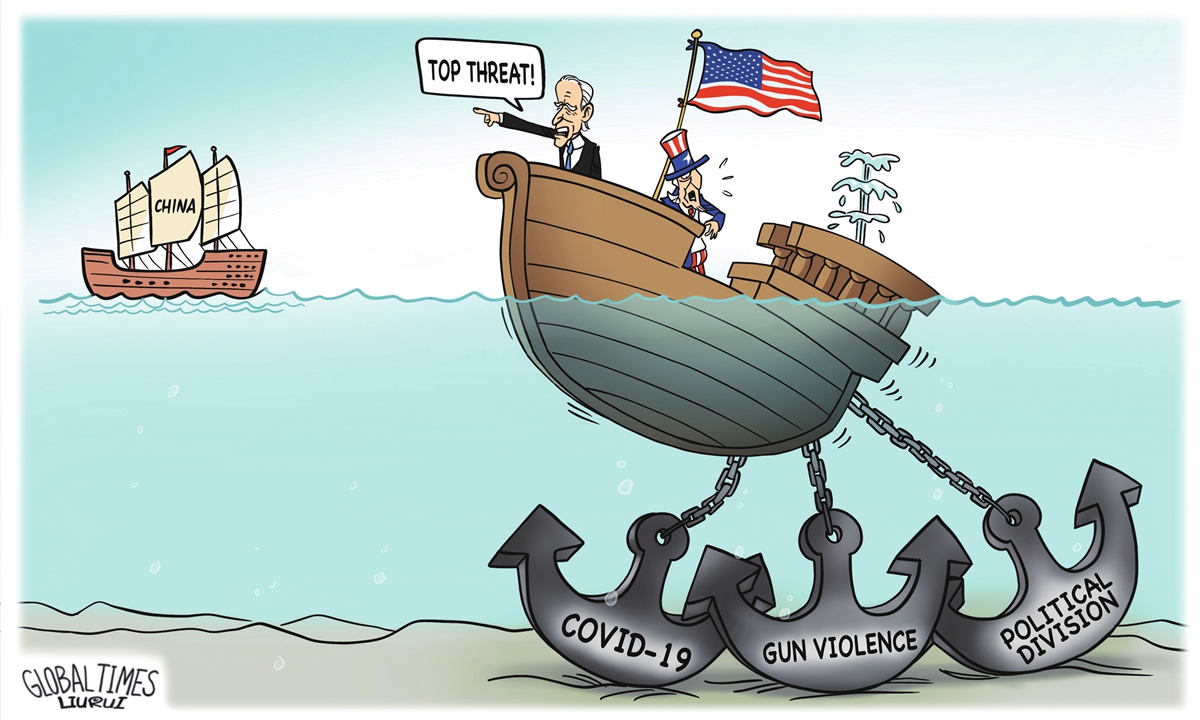Biden hypes China's cyber threat to intel agency to 'justify own online attacks,' ratchets up pressure on Beijing

Illustration: Liu Rui/GT
The Biden administration is mobilizing the US intelligence community to speed up its strategic containment to crush China by hyping cyber threats from China, which increased the risks of its rationalizing its cyberattacks against other countries, analysts said on Wednesday after President Joe Biden highlighted growing "threats" posed by Russia and China to the US' national security.
In his first visit to the Office of the Director of National Intelligence (ODNI) since taking office, Biden delivered a speech to the intelligence agency on Tuesday, where he highlighted China's growing threat in cyberspace, and warned of a "real shooting war" with a "major power" caused by cyberattacks on the US.
Chinese observers believe this is an "internal mobilization" to the intelligence agency aimed at urging the agency to speed up to contain China and Russia in cyberspace, which signaled possible cyberattacks from the US against other countries.
The US president cited looming challenges from China and Russia — which he described as "potentially mortal competitors, down the road" — and said he thought significant disruptions in the cyber domain could risk leading to armed conflict, CBS News reported.
Biden said he believes it is more likely the US could "end up in a real shooting war with a major power," as the consequence of a cyber breach, according to the report. The ODNI oversees 17 US intelligence organizations.
With mentioning China five times, Biden's remarks again exposed his fear of the US' decline in its stature and power, and his concern over whether the American system could effectively work when faced with challenges like the pandemic, economic recession and domestic strife, said Lü Xiang, a research fellow on US studies at the Chinese Academy of Social Sciences in Beijing. "Other officials in the White House also fear China's unparalleled success in a number of things such as fighting and controlling COVID-19."
Lü said Biden's speech was more like a "demonstration of US strength" of its military and in cyberspace, which requires China to stay alert on possible cyberattacks from the US under the excuse of countermeasures.
Despite the recent visit by US Deputy Secretary of State Wendy Sherman to China which some observers see as a positive signal that China and the US are at least willing to sit down and try to ease tensions through dialogue, Washington has not given up its all-around containment strategy against Beijing, analysts said.
US Defense Secretary Lloyd Austin claimed during a trip to Asia this week to challenge what he called China's aggression. He said during his visit to Singapore on Tuesday the US seeks a stable relationship with China after he touched on the usual list of behaviors Washington described as "destabilizing, from Taiwan to the South China Sea," Reuters reported.
He said, "We will not flinch when our interests are threatened, yet we do not seek confrontation."
On Wednesday, US Secretary of State Antony Blinken met a representative of the Dalai Lama, in the Indian capital, according to a US State Department spokesperson, India local media reported.
In response to Austin's remarks, Chinese Foreign Ministry's spokesperson Zhao Lijian said at Wednesday's regular press conference that the remarks from the US side, in disregard of facts, deliberately smear China, meddle in China's domestic affairs and attempt to sow discord between regional countries. The aim is to serve selfish geopolitical gains.
"We urge the US not to make an issue out of China at every turn and instead do more things conducive to regional peace and stability. China's position on relations with the US is clear-cut. The US should adopt an objective and correct perception of China," he said.
Observers slammed the US claim of seeking a stable relationship with China as being extremely hypocritical, and the trend is clear that Washington is imposing all-around strategic pressure against Beijing.
"The US is initiating a mixture of 'war forms' against China. As the biggest empire of cyberhacks, the US shows its intention of attacking China from the cyber domain. And meeting the Dalai Lama is part of its efforts to wage a color revolutionary war or ideological one," Song Zhongping, a military expert and TV commentator told the Global Times on Wednesday.
And seeking an anti-China alliance in the South China Sea region in the name of counter "aggression" proves its military motives; smearing China based on non-facts is the public opinion weapon it uses in its warfare, Song noted.
To counter the US pressure, China is enhancing pragmatic cooperation with other countries and is showing a tough stance refuting US with reason and safeguarding its own interests in diplomatic settings, Xin Qiang, a deputy director of the Center for US Studies at Fudan University.
Strength matters in deciding the future of China-US ties. If China would continue or even close the strength gap with the US would be the decisive factor. And China is confident to achieve that, Xin added.
However, Chinese observers dismissed the strong possibility of having a "hot war" among major powers, as the gap in military strength between China and the US is shrinking, and the US will not easily use military force against China.
In his speech, Biden also urged the intelligence agency to "increase your ranks with people with significant scientific capacity relative to pathogens," media reported.
In May, Biden asked the intelligence agencies to "redouble" their efforts to investigate the origins of the COVID-19 pandemic, setting a deadline of 90 days for them to "collect and analyze information that could bring us closer to a definitive conclusion."
"It's really not that hard for people to see through the cunning move," said Lü, pointing out that requesting the intelligence agency to investigate a scientific issue with a deadline is "ridiculous," exposing Washington's intention to use political tools to manipulate the issue.
While the Biden administration is seeking to turn cyberspace into a new battlefield by ganging up with its allies to accuse China of conducting cyberattacks worldwide, observers said the series of anti-China strategies have gained little.
The Biden administration is carrying out a political warfare against China in different forms, and one of the most striking forms is an information war, Lü noted. "Biden is trying to rebuild public confidence in the US' political system by smearing China's success with a sustained information war, Lü said, noting it will never stop China from developing."
The disorderly policies have only upset the US public as the president's latest job approval dropped to 50 percent, marking his lowest to date, media reported recently.
Photos
Related Stories
Copyright © 2021 People's Daily Online. All Rights Reserved.










